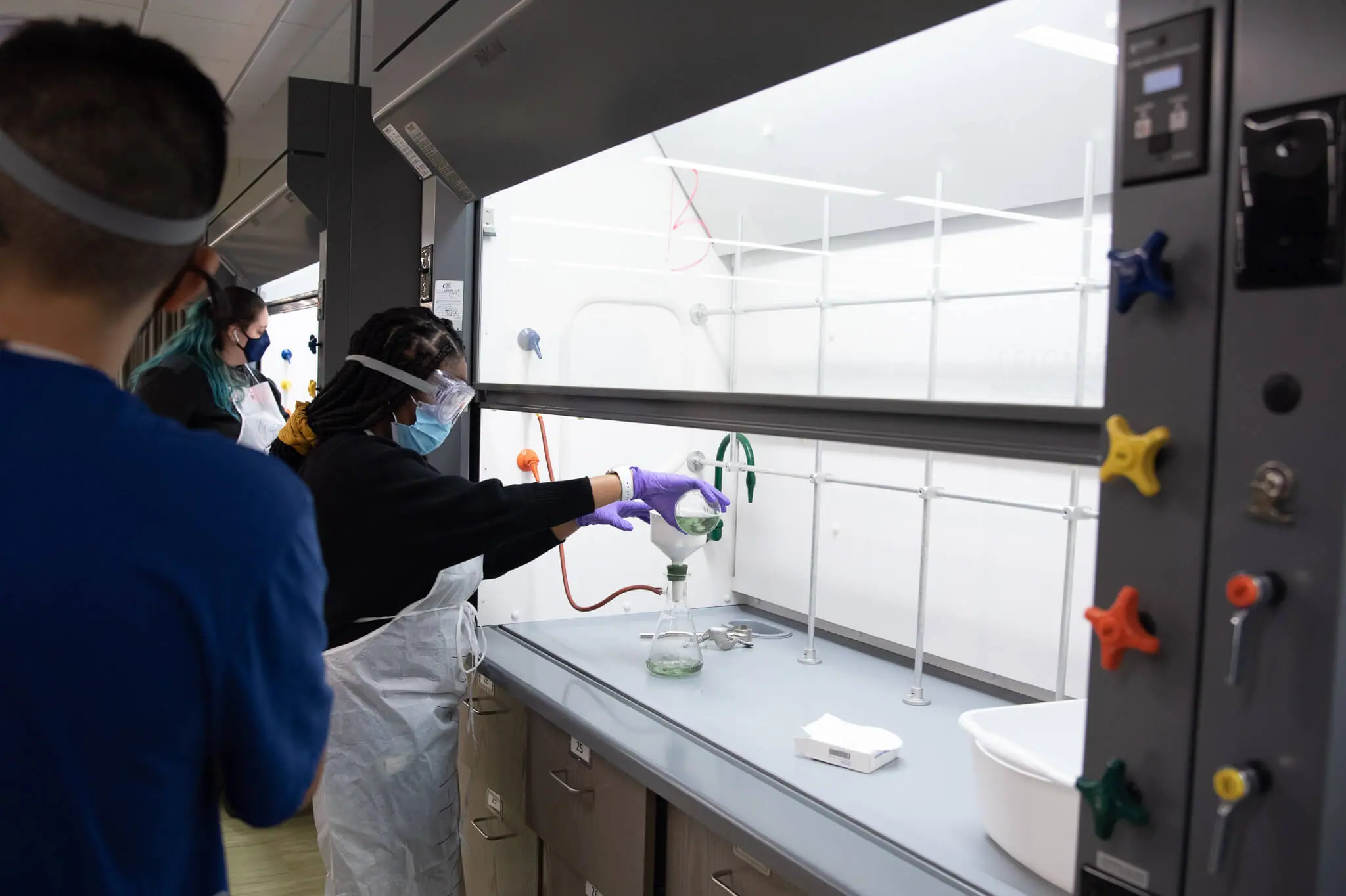NIH grant to STAMP professor Tugba Kucukkal
Dr. Tugba Kucukkal has been awarded by the National Institute of General Medical Sciences
Dr. Tugba Kucukkal, an associate professor of chemistry in the School of Science, Technology, Accessibility, Mathematics, and Public Health, has been awarded a $368,671 grant by the National Institute of General Medical Sciences (NIGMS) of the National Institutes of Health.
Dr. Kucukkal, along with co-investigators Dr. Adebowale Ogunjirin and Dr. Daniel Lundberg, seeks to identify novel nonpeptide-based selective inhibitors for polo-box domain (PBD) of polo-like kinase 1 (PLK1) that can be used for targeted cancer therapies. Given its major role in mitotic events, PLK1 is a marker for cellular proliferation with a prognostic potential in some types of cancers. A high level of PLK1 expression is associated with a poor prognosis. Studies have shown that the loss of PLK1 expression can induce apoptosis and inhibit growth in many cancer cells while showing an insignificant effect on normal cells in mouse models. On the other hand, PLK2 and PLK3 have been identified as tumor suppressors. Therefore, selective and specific inhibition of PLK1 is a promising therapeutic strategy for a range of cancer types.
In this study, the rationale for targeting the PBD as opposed to the kinase catalytic domain (KCD) is that the KCD is conserved among kinases and therefore poses selectivity and toxicity problems. PLK1 inhibitors will be identified in several steps:
1. Small molecules with known binding profiles to PLK1-3 will be studied through molecular dynamics (MD) simulations to gain atomistic insights for the key interactions needed for strong binding profile for PLK1 but not for PLK2-3.
2. COCONUT natural products database and Atomwise company small molecule database will be screened to identify potential inhibitors. The top hit candidates will be studied through MD and ADMETS (absorption, distribution, metabolism, excretion, toxicity, and stability) simulations to reduce the number of candidates.
3. The top molecules will be studied through advanced MD and fluorescence polarization experiments.
According to Dr. Kucukkal, the proposed study is innovative in many aspects, but particularly for its unique design for allowing meaningful participation of deaf and hard of hearing undergraduate and high school students. The major outcome of the study is that it is expected to provide a starting point for a drug design pipeline for the PBD of PLK1 and further guide the in vivo experiments and/or clinical considerations.
The title of Dr. Kucukkal’s project is “Identification of Novel, Selective Plk1 Inhibitors through Molecular Modeling and Fluorescence Polarization Experiments.” This research is made possible by the National Institute of General Medical Sciences (NIGMS) of the National Institutes of Health under grant number 1R15GM148942-01 for the amount of $368,671.
Dr. Kucukkal has been involved with three mentoring-based grants during her time at Gallaudet, all with other Science, Technology, Accessibility, Mathematics, and Public Health (STAMP) faculty members.
Congratulations!
From the same category
NIH grant to STAMP professor Tugba Kucukkal
Dr. Tugba Kucukkal has been awarded by the National Institute of General Medical Sciences
Dr. Tugba Kucukkal, an associate professor of chemistry in the School of Science, Technology, Accessibility, Mathematics, and Public Health, has been awarded a $368,671 grant by the National Institute of General Medical Sciences (NIGMS) of the National Institutes of Health.
Dr. Kucukkal, along with co-investigators Dr. Adebowale Ogunjirin and Dr. Daniel Lundberg, seeks to identify novel nonpeptide-based selective inhibitors for polo-box domain (PBD) of polo-like kinase 1 (PLK1) that can be used for targeted cancer therapies. Given its major role in mitotic events, PLK1 is a marker for cellular proliferation with a prognostic potential in some types of cancers. A high level of PLK1 expression is associated with a poor prognosis. Studies have shown that the loss of PLK1 expression can induce apoptosis and inhibit growth in many cancer cells while showing an insignificant effect on normal cells in mouse models. On the other hand, PLK2 and PLK3 have been identified as tumor suppressors. Therefore, selective and specific inhibition of PLK1 is a promising therapeutic strategy for a range of cancer types.
In this study, the rationale for targeting the PBD as opposed to the kinase catalytic domain (KCD) is that the KCD is conserved among kinases and therefore poses selectivity and toxicity problems. PLK1 inhibitors will be identified in several steps:
1. Small molecules with known binding profiles to PLK1-3 will be studied through molecular dynamics (MD) simulations to gain atomistic insights for the key interactions needed for strong binding profile for PLK1 but not for PLK2-3.
2. COCONUT natural products database and Atomwise company small molecule database will be screened to identify potential inhibitors. The top hit candidates will be studied through MD and ADMETS (absorption, distribution, metabolism, excretion, toxicity, and stability) simulations to reduce the number of candidates.
3. The top molecules will be studied through advanced MD and fluorescence polarization experiments.
According to Dr. Kucukkal, the proposed study is innovative in many aspects, but particularly for its unique design for allowing meaningful participation of deaf and hard of hearing undergraduate and high school students. The major outcome of the study is that it is expected to provide a starting point for a drug design pipeline for the PBD of PLK1 and further guide the in vivo experiments and/or clinical considerations.
The title of Dr. Kucukkal’s project is “Identification of Novel, Selective Plk1 Inhibitors through Molecular Modeling and Fluorescence Polarization Experiments.” This research is made possible by the National Institute of General Medical Sciences (NIGMS) of the National Institutes of Health under grant number 1R15GM148942-01 for the amount of $368,671.
Dr. Kucukkal has been involved with three mentoring-based grants during her time at Gallaudet, all with other Science, Technology, Accessibility, Mathematics, and Public Health (STAMP) faculty members.
Congratulations!





